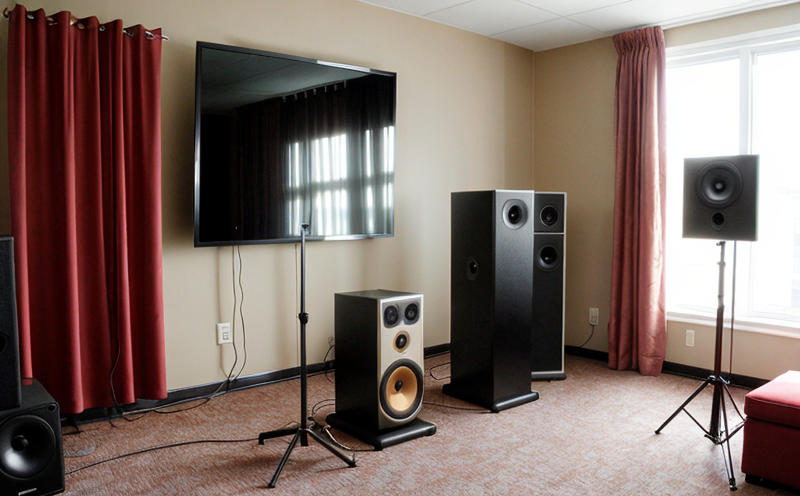ISO/TS 15666 Questionnaire Testing for Noise Annoyance in Humans
The ISO/TS 15666 questionnaire testing protocol is designed to assess noise annoyance among human populations, providing a standardized method for measuring the subjective impact of sound on individuals. This service is crucial for industries where noise pollution can affect employees or residents, including manufacturing, construction, and transportation sectors.
ISO/TS 15666 focuses on understanding how different types of noise, such as industrial machinery, traffic sounds, or aircraft noise, contribute to annoyance levels among people. The test involves administering a structured questionnaire that captures the subjective responses of individuals regarding their reactions to various sound stimuli. This approach is particularly valuable for identifying which aspects of noise are most disturbing and for what populations.
The testing process typically begins with selecting an appropriate sample size that represents the target population. Each participant completes the questionnaire under controlled conditions, ensuring consistency across all assessments. The questionnaire includes a series of questions designed to elicit detailed feedback on sound characteristics like frequency, intensity, duration, and temporal pattern, which are known contributors to annoyance.
After collecting responses, data is analyzed using statistical methods that quantify the level of noise annoyance. These analyses help in identifying key factors contributing to higher levels of discomfort or irritation among participants. The results provide insights into the most effective ways to mitigate noise pollution, whether through engineering solutions, policy changes, or operational adjustments.
The application of ISO/TS 15666 extends beyond mere compliance with international standards; it also serves as a valuable tool for R&D teams in developing quieter products and environments. By understanding how different sound characteristics affect human perception, manufacturers can design more efficient noise reduction strategies that enhance overall user satisfaction.
This service is essential for ensuring regulatory compliance with local and international regulations regarding environmental noise. Compliance officers rely on accurate assessment methods to demonstrate adherence to these standards, thereby protecting their organizations from potential legal risks associated with non-compliance.
In summary, ISO/TS 15666 questionnaire testing offers a comprehensive approach to evaluating the impact of sound on human populations. Its standardized methodology ensures consistency and reliability in measuring noise annoyance, making it an indispensable tool for industries seeking to minimize environmental impacts while maintaining high standards of product quality and user satisfaction.
Applied Standards
The ISO/TS 15666 questionnaire testing protocol is based on the International Organization for Standardization (ISO) and Technical Specification (TS) guidelines. This standard provides a structured framework for conducting noise annoyance surveys, ensuring that all assessments are conducted consistently across different environments and populations.
- ISO/TS 15666-2: Guidance on the design of sound scenes to be used in psychoacoustic tests.
- ISO/TS 15666-3: Instructions for conducting annoyance surveys using questionnaires.
The application of these standards ensures that all testing is conducted according to best practices, thereby providing reliable and valid results. Compliance with ISO/TS 15666 helps organizations meet regulatory requirements while also enhancing their reputation as leaders in environmental responsibility.
Frequently Asked Questions
Benefits
- Enhanced Compliance: Ensures that all tests meet international standards, facilitating easier compliance with local regulations.
- Data Reliability: Standardized methodologies provide consistent and reliable data across different environments and populations.
- Improved Product Design: Understanding human perception helps in creating quieter products that enhance user satisfaction and reduce noise pollution.
- Better Decision-Making: Accurate assessments lead to more informed decisions, guiding effective strategies for reducing noise annoyance.
- Environmental Responsibility: By identifying sources of annoyance, organizations can take steps to mitigate environmental impacts, contributing positively to sustainability efforts.
The combination of these benefits makes ISO/TS 15666 questionnaire testing an indispensable service for industries seeking to balance operational efficiency with environmental responsibility and regulatory compliance.
Environmental and Sustainability Contributions
By accurately assessing noise annoyance, this service plays a crucial role in promoting environmental sustainability. Understanding how sound affects human populations enables organizations to implement measures that reduce noise pollution, thereby improving quality of life for affected communities. This contributes not only to regulatory compliance but also to the broader goal of creating more sustainable and healthier environments.
Moreover, the insights gained from this testing can lead to innovations in product design and operational practices, further enhancing sustainability efforts. For instance, manufacturers can develop quieter machinery that reduces noise levels during operation, while urban planners can design spaces with sound-absorbing materials to minimize environmental impact.
The service also supports corporate social responsibility initiatives by helping companies demonstrate their commitment to reducing negative impacts on the environment and human health. This aligns with broader sustainability goals and enhances an organization's reputation as a responsible and forward-thinking entity.





